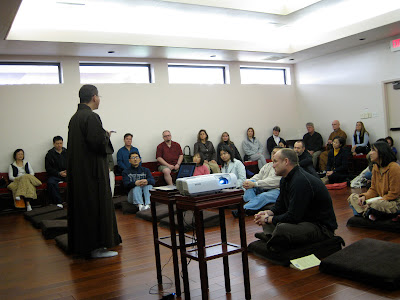Date: March 17, 2007
Time: 10am – noon
Location: Fo Guang Shan Hawaii Center@ Chinese Culture Plaza
The Abbot of Fo Guang Shan Hawaii Center, Venerable Yi Hong, was generous enough to give their regularly scheduled book club meeting time to Venerable Jian Dan for a dharma talk. Venerable Jian Dan used some frequently used Chinese idioms to illustrate some Buddhist concepts. Interestingly, many of these Chinese idioms were originally from Buddhist text. However, over the years, their meanings have changed. For example, tian hua luan zhui (天花亂墜) means smooth talking that stretches the truth. However, from the Buddhist text, it means heavenly beings are so joyful after hearing Buddha’s teaching, they drop flowers from heaven to express their appreciation.

After a short and humorous talk, attendees started to ask questions. For example, one person asked, if Buddhism talks about cause and effect and stresses that we are always the receiver of our own action, no one else could take our consequences away from us, then why when America made a big mistake and dug a big financial hole that caused economical crisis, the rest of the world has to suffer with America? In other words, America created the cause but everyone else suffers the effects? Venerable quickly pointed that there are at least two kinds of karma – individual karma (別業) and collective karma (共業). Countries that have a close economic tie to America share the collective karma, therefore suffer when the entire economy changes. However, not all countries or all companies are losing money under current situation. They have individual karma that separates them from America, therefore can avoid been affected by the economy.

After the talk, Venerable stayed for some delicious homemade vegetarian meals. Another visiting Buddhist nun, Venerable Yi Fa, also joined for lunch. During lunch, Abbot introduced both Venerables and praised Venerable Jian Dan for his right view, sharp concepts, and skillful presentations.
Many members gathered around Venerable Jian Dan after lunch and continued to seize the opportunity to ask more questions. Most of them commended on his talk and was eager to see him visit Hawaii again.






















